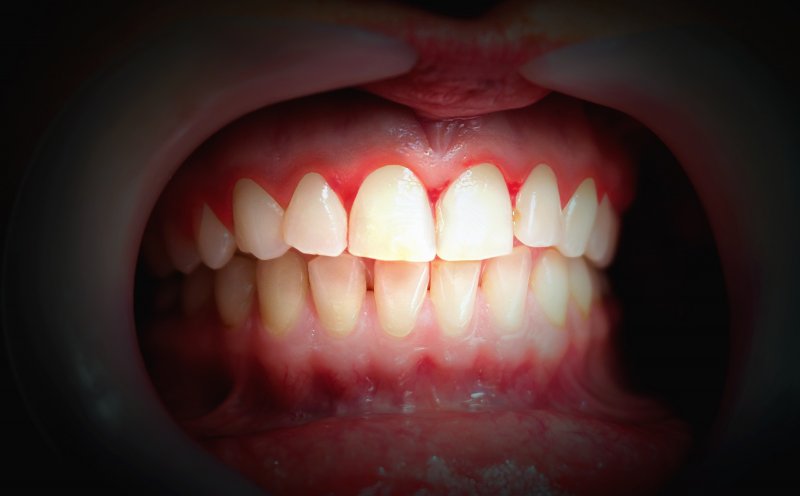
If you find a bit of blood on your toothbrush or your dental floss, you might think it’s no big deal at first. But if it keeps happening, you should definitely take notice. Bleeding gums are not normal; in fact, they’re most likely a sign that an infection has formed in your mouth. If you’re not careful, you may eventually end up with an incomplete smile as well as a variety of health issues. Take advantage of Gum Disease Awareness Month by learning more about the real reason why your gums bleed.
Why Do Gums Bleed Easily During Gum Disease?
Gum disease (also called periodontal disease) likely means that the plaque that constantly builds up in your mouth has not been cleaned away adequately. The germs in plaque will attacks the gum tissue protecting the roots of your teeth, causing it to become inflamed and irritated. As a result, your gums will be very sensitive and more likely to bleed when prodded by your toothbrush or dental floss.
Can You Ignore Bleeding Gums?
Early gum disease is often painless; your bleeding gums might very well be the only sign that there’s something wrong. However, the longer you wait to have your gums treated, the worse the infection will become. Eventually the gums will separate from the teeth and pull back, forming periodontal pockets where bacteria and germs can become trapped and start to attack the jawbone. When enough bone is destroyed, you could lose some of your teeth altogether.
The rest of your body could be in danger as well. The inflammation that occurs in your gums could also spread to other areas once oral bacteria enter the bloodstream (which they’ll certainly have a chance to do if your gums keep bleeding). Studies suggest that this could be a contributing factor to a higher risk of heart disease, diabetes, and even pregnancy complications.
What Should You Do If Your Gums are Bleeding?
Early gum disease is relatively simple to treat and even reverse, but only if you act quickly. Make an appointment with your dentist as soon as you notice any bleeding, especially if it’s accompanied by loose teeth, bad breath, and swollen gums. Improving your oral hygiene will likely be an important part of your treatment, so be sure to:
- Brush after every meal as well as right before
bed. - Floss once or twice a day to get rid of plaque
between the teeth. - Use antibacterial mouthwash after brushing.
- Visit your dentist once every six months at
minimum.
Your dentist will be able to design an appropriate treatment plan to fight your infection; they can also advise you on ways to improve your oral health and prevent gum disease in the future. Make sure to voice any questions or concerns you have about your gum health during your appointment. Doing so could be exactly what it takes to keep your smile safe.
About 21st Century Dental of Irving
Dr. Smith, Dr. Roy, Dr. Bristow, and Dr. Barnett all bring their unique skills together here at 21st Century Dental of Irving, bringing specialty care and other treatment options to their patients in one convenient location in Irving. They can perform important diagnostic care and offer different kinds of therapy in order to prevent severe gum disease. If you have bleeding gums, make an appointment with us today by visiting our website or calling (972) 255-3712.
